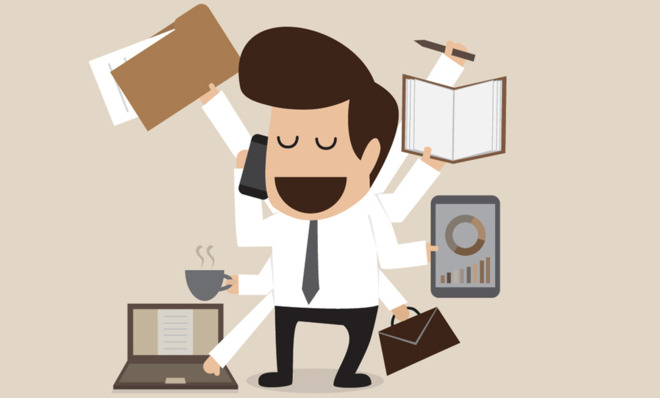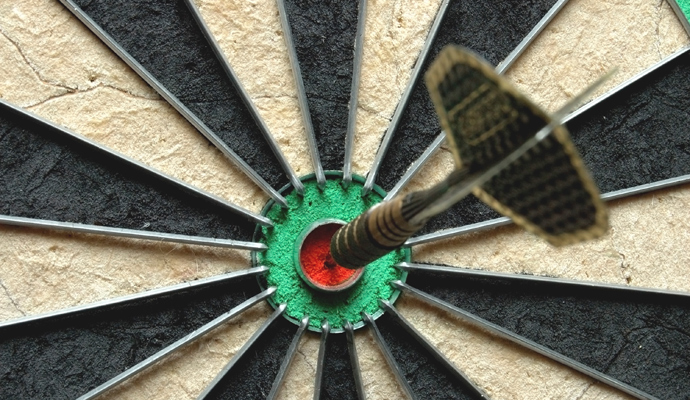How to be the most productive person in your office — and still get home by 5:30 p.m.
Rule number one: To-do lists are evil. Schedule everything.

A free daily email with the biggest news stories of the day – and the best features from TheWeek.com
You are now subscribed
Your newsletter sign-up was successful

Some days the to-do list seems bottomless. Just looking at it is exhausting.
We all want to know how to stop being lazy and get more done. I certainly want the answer.
So I decided to call a friend who manages to do this — and more.
The Week
Escape your echo chamber. Get the facts behind the news, plus analysis from multiple perspectives.

Sign up for The Week's Free Newsletters
From our morning news briefing to a weekly Good News Newsletter, get the best of The Week delivered directly to your inbox.
From our morning news briefing to a weekly Good News Newsletter, get the best of The Week delivered directly to your inbox.
Cal Newport impresses the heck out of me. Why? Well, I'm glad you asked. He's insanely productive:
- He has a full-time job as a professor at Georgetown University, teaching classes and meeting with students.
- He writes six (or more) peer-reviewed academic journal papers per year.
- He's the author of four books including the wonderful So Good They Can't Ignore You. And he's at work on a fifth.
- He's married with a young child and handles all the responsibilities that come with being a husband and dad.
- He blogs regularly about productivity and expert performance.
And yet he finishes work at 5:30 p.m. every day and rarely works weekends.
No, he does not have superpowers or a staff of 15. Okay, let's you and I both stop being jealous of his productivity for a second and learn something.
Below you'll get Cal's secrets on how you can better manage your time, stop being lazy, get more done — and be finished by 5:30. Let's get to work.
A free daily email with the biggest news stories of the day – and the best features from TheWeek.com
1) To-do lists are evil. Schedule everything.
To-do lists by themselves are useless. They're just the first step. You have to assign them time on your schedule. Why?
It makes you be realistic about what you can get done. It allows you to do tasks when it's efficient, not just because it's #4.
Until it's on your calendar and assigned an hour, it's just a list of wishful thinking.
Here's Cal:
Scheduling forces you to confront the reality of how much time you actually have and how long things will take. Now that you look at the whole picture you're able to get something productive out of every free hour you have in your workday. You not only squeeze more work in but you're able to put work into places where you can do it best.
Experts agree that if you don't consider how long things take, you're setting yourself up for failure.
I can hear what some of you are thinking: But I get interrupted. Things get thrown at me last minute.
Great — build that into your schedule. It doesn't need to be perfect. Things will change. But you need to have a plan, otherwise you'll waste time.
Want to stop procrastinating? Schedule. Here's Cal:
Assigning work to times reduces the urge to procrastinate. You are no longer deciding whether or not to work during a given period; the decision is already made.
Does this sound too mechanical? Overly structured and not much fun? Wrong.
Research shows that it's even a good idea to schedule what you do with your free time. It increases quality of life:
This study was designed to identify the relationship between free time management and quality of life, exploring whether the amount of free time or the way people using their free time relates to their quality of life… The result has found a positive relationship between free time management and quality of life.
(For more on the schedule the most productive people use, click here.)
Okay, the to-do list is in the trash and things are going on the calendar. How do you prioritize so you're not at work forever?
2) Assume you're going home at 5:30, then plan your day backwards.

Work will fill the space it's given. Give it 24/7 and guess what happens?
You need boundaries if you want work/life balance. But this also helps you work better because it forces you to be efficient.
By setting a deadline of 5:30 and then scheduling tasks you can get control over that hurricane of duties.
Cal calls it "fixed schedule productivity":
Fix your ideal schedule, then work backwards to make everything fit — ruthlessly culling obligations, turning people down, becoming hard to reach, and shedding marginally useful tasks along the way. My experience in trying to make that fixed schedule a reality forces any number of really smart and useful in-the-moment productivity decisions.
What does research say prevents you from getting burned out at work? Feeling in control of your schedule.
Anything that increases your perception of control over a situation — whether it actually increases your control or not — can decrease your stress level.
According to Your Brain at Work: Strategies for Overcoming Distraction, Regaining Focus, and Working Smarter All Day Long, "Over and over, scientists see that the perception of control over a stressor alters the stressor's impact."
(For more on how to achieve work/life balance, click here.)
You've drawn a line in the sand and worked backward, giving all your tasks hours in your day. But how do you handle longer term projects?
3) Make a plan for the entire week.
I think you'll agree that the last thing this world needs is more short-term thinking.
You'll never get ahead of the game by only looking at today and never thinking about tomorrow.
How do you write books, teach classes, meet with students, do research papers, and be a good parent consistently? Plan the week.
Here's Cal:
People don't look at the larger picture with their time and schedule. I know each day what I'm doing with each hour of the day. I know each week what I'm doing with each day of the week and I know each month what I'm doing with each week of the month.
Are you rolling your eyes? Does this sound overbearing? It's simpler than you think. What's really necessary?
Just one hour every Monday morning. Here's Cal:
Every Monday I lay out a plan for the week. I go through my inbox, I go through my task list, I go through my calendar, and try to come away with the best thing to do with each day this week. I write it in an email and I send it to myself and leave it in my inbox because that's a place I know I will see it every day and I'll be reminded of it multiple times throughout the day.
And he's right. Research shows you spend your time more wisely when you follow a plan.
Preliminary analysis from CEOs in India found that a firm's sales increased as the CEO worked more hours. But more intriguingly, the correlation between CEO time use and output was driven entirely by hours spent in planned activities. Planning doesn't have to mean that the hours are spent in meetings, though meetings with employees were correlated with higher sales; it's just that CEO time is a limited and valuable resource, and planning how it should be allocated increases the chances that it's spent in productive ways. [What the Most Successful People Do at Work: A Short Guide to Making Over Your Career]
Maybe you think it's enough to run down the week's duties in your head. Nope.
Studies show writing things down makes you more likely to follow through.
(For more on how the most productive people get things done, click here.)
So you've got a fixed schedule and a weekly plan — but the math doesn't add up. There's just too much stuff. Cal has an answer for that too.
4) Do very few things, but be awesome at them.

Maybe you're thinking: I just have too many things to do. I could never get it all done in that amount of time.
And Cal concedes that you might be right. But the answer isn't throwing up your arms and working until 10PM.
You need to do fewer things. Everything is not essential. You say "yes" to more than you need to.
Ask "What's creating real value in my life?" And then eliminate as much of the rest as you can.
Here's Cal:
You're judged on what you do best so if you want to have as much success as possible you're always better off doing fewer things but doing those things better. People say yes to too much. I say no to most things. I'm ruthless about avoiding or purging tasks if I realize they're just not providing much value.
You feel like you have no time but John Robinson, the leading researcher on time use, disagrees. We may have more free time than ever.
He insists that although most Americans feel they're working harder than ever, they aren't. The time diaries he studies show that average hours on the job, not only in the United States but also around the globe, have actually been holding steady or going down in the last forty years. Everybody, he says, has more time for leisure. [Overwhelmed: Work, Love, and Play When No One Has the Time]
So what gives? It feels like you have no time because it's so fragmented with little annoying tasks that drain the life out of you.
So do less. And be amazing at those things.
(For more on what the most successful people do, click here.)
Your plans are in order and by doing less, it all fits on the schedule. But one question remains: what exactly should you be doing with your time?
5) Do less shallow work — focus on the deep stuff.
All work is not created equal. Cal says knowledge workers deal with two fundamentally different types of work, shallow and deep:
Shallow work is little stuff like email, meetings, moving information around. Things that are not really using your talents. Deep work pushes your current abilities to their limits. It produces high value results and improves your skills.
And what's the problem? Most of us are "drowning in the shallows":
People who are the most busy often are getting a lot less done of significance than the people who are able to stop by 5PM every day. That's because the whole reason they need to work at night and on the weekends is because their work life has become full of just shallows. They're responding to messages, moving information around, and being a human network router. These things are very time consuming and very low value.
Nobody in the history of the universe ever became CEO because they responded to more email or went to more meetings. No way, Bubba.
Cal has it right: Shallow work stops you from getting fired — but deep work is what gets you promoted.
Give yourself big blocks of uninterrupted time to make things of value. What's the best first step?
Stop checking email first thing in the morning. Tim Ferriss, author of the international bestseller, The 4-Hour Workweek, explains:
…whenever possible, do not check email for the first hour or two of the day. It's difficult for some people to imagine. "How can I do that? I need to check email to get the information I need to work on my most important one or two to-dos?"
You would be surprised how often that is not the case. You might need to get into your email to finish 100 percent of your most important to-dos. But can you get 80 or 90 percent done before you go into Gmail and have your rat brain explode with freak-out, dopamine excitement, and cortisol panic? Yes.
(For more on how to motivate yourself, click here.)
So how do we tie all this together?
Sum up
Cal's five big tips:
- To-do lists are evil. Schedule everything.
- Assume you're going home at 5:30, then plan your day backwards.
- Make a plan for the entire week.
- Do very few things, but be awesome at them.
- Do less shallow work — focus on the deep stuff.
Schedules and plans sound cold and clinical but the end result couldn't be farther from that.
You'll be less stressed, create more time for friends and family, and make things you can be proud of.
Here's Cal:
Knowledge work is really just craftsmanship. It's just that what you're crafting is information and not carved wood. You're crafting ideas. You're crafting knowledge out of raw material and the more you think about it like a craftsman, the happier and more satisfied you'll be, not to mention more successful.
The offices of the world could use a few less cubicle drones and a few more proud craftsmen.
A PDF of the extended interview with Cal (including his research on how geniuses work) will be in my next weekly email. Sign up to get it here.
Join 100K+ readers. Get a free weekly update via email here.
More from Barking Up The Wrong Tree...
-
 Political cartoons for February 15
Political cartoons for February 15Cartoons Sunday's political cartoons include political ventriloquism, Europe in the middle, and more
-
 The broken water companies failing England and Wales
The broken water companies failing England and WalesExplainer With rising bills, deteriorating river health and a lack of investment, regulators face an uphill battle to stabilise the industry
-
 A thrilling foodie city in northern Japan
A thrilling foodie city in northern JapanThe Week Recommends The food scene here is ‘unspoilt’ and ‘fun’